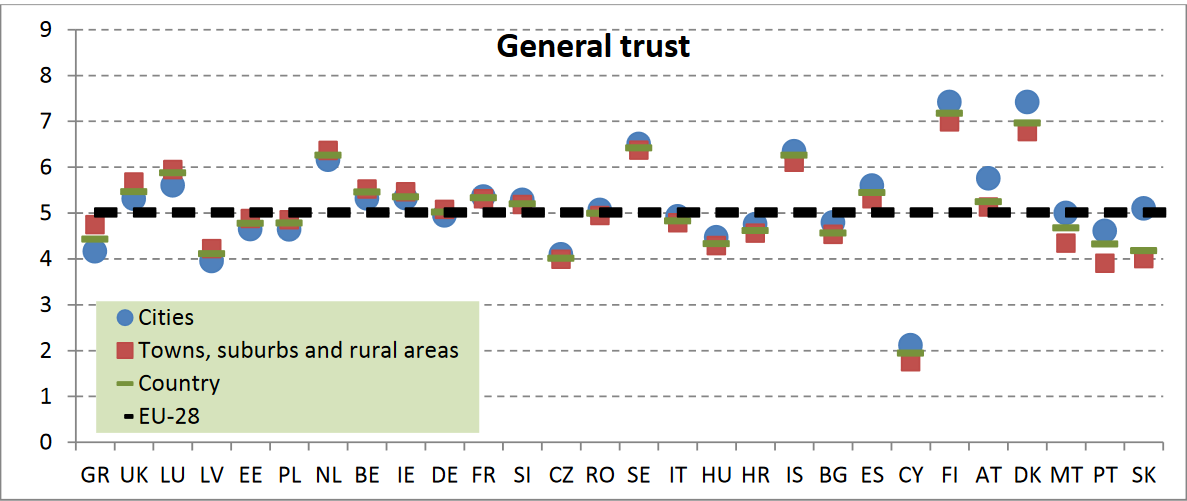Trust and quality of public services
There is a recognised belief that countries with better institutions—both soft, such as trust and norms, and hard, such as rule of law and good governance—can expect better economic performance, lower crime rates, and greater voter turnout, among others. A joint project between DG REGIO and DG JRC investigated the within-country variability in citizens ‘perception of trust, corruption, local governance and quality of public service phenomena. It produced several composites indicators presenting the within-country variability based on the European Quality of Life Survey. It explored the level of (1) general trust, (2) institutional trust and (3) quality of public service with respect to degree of urbanization in different EU countries.
General trust was measured by the following question: Would you say that most people can be trusted?
Institutional trust combined trust towards national parliament, legal system, press, police, government and local authorities.
Quality of public service was measured by questions describing quality of the following public service: health services, education system, public transport, child-care service, long-term care service, social or municipal housing, state pension system.
Each of these indicators was produced for EU28 countries at EU and national level as well as by degree of urbanisation.

The results showed that in respect to within-country variability according to the degree of urbanisation, there are differences with respect to the level of generalised trust both between countries and within countries. The highest level of generalised trust is recorded in the Nordic countries, whereas the lowest is in the Central and Eastern European (CEE) countries and Southern European countries. In addition, Slovakia, which scores the fourth worst is also the most diversified country with the difference of generalised trust score between cities and towns, suburbs and rural areas. It is followed by Portugal, Malta, Denmark, Austria and Greece. The least diversified country with respect to generalised trust is France.
With respect to within-country variability of institutional trust, in general the level of this phenomenon is not diversified. However, in Denmark, Austria, Hungary, Finland, Cyprus, Bulgaria and the Czech Republic the recorded differences are the highest and are always in favour of cities. The only exception to this reasoning is Bulgaria, where institutional trust is higher in towns, suburbs and rural areas than in cities.
With respect to within-country variability of the quality of public service, next to countries in which we observe almost no differences in the level of this phenomenon, there are also countries in which considerable differences with respect to the quality of public service are observed. France, the Netherlands, Ireland, Spain and Belgium have cities that performed better in terms of public service than other areas. In Denmark and Bulgaria, the quality of public service is considerably better in towns, suburbs and rural areas
For further details, see the following publication:
Trust, local governance and quality of public service in EU regions and cities (JRC Science and Policy Reports, European Commission, Joint Research Centre)
| Originally Published | 18 Jul 2018 |
| Knowledge service | Metadata | Territorial (ARCHIVED) |
